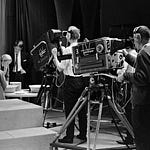For a more extended treatment of polishing you sitcom script, check out 14 Problems with Your Sitcom Script.
Each scene of your sitcom is like a sketch. It’s somewhere between ten seconds and four minutes long with one or two simple ideas at the heart of it. And each scene, like a good sketch, should have some kind of punchline at the end. You want a line, or action, that gives a feeling of completeness that the scene is over and a comic spring into the next scene.
In a sitcom, there needs to be a very good reason for the scene not to end on a joke. Two possible exceptions would be trying to create an emotional climax that is being played for realism, in order to make the other stuff funnier. Even then, there’s often room for a little kicker. The other exception would be setting up a joke that is immediately paid off at the start of the next scene. But both of these are fairly rare. If you’ve got 12-15 scenes in a show, all but one or two should end on a joke. And sometimes, not even that.
This is easier said than done, but it’s always worth spending an extra few minutes on a joke for the end of the scene. Sometimes these come naturally – but often they don’t. So if you’re struggling, here are some possible to solutions to getting your scene to end with a joke:
1. Keep Struggling. Not all that helpful a suggestion, I know, but spend another ten minutes on it. Have a coffee. Walk around. Take a piece of paper and a pen and make some doodles or jot down ideas rather than staring at the script on the screen. But overall, just try harder to think of a decent line or action or comment that’s funny. Sometimes, it really is that simple.
2. Assuming you’ve spent ages on it, or this is the second or third draft and nothing’s presented itself, try changing the penultimate line and see if that sets up a different joke. If that doesn’t work, go back another few lines. Scenes are often conversational stepping stones in sitcoms. You often need to hop from one idea or line to the next, so changing the route might present new areas and ideas.
3. Look for ways to end the scene earlier. If there’s a really funny joke in the scene, is there any way you could cut the rest of the dialogue afterwards? Do you really need the rest of the scene? Does it advance the story? Is it funnier than that really good joke? If the answer to all these questions is ‘no’, you’ve got a punchline. End on the funny bit.
4. It may be that you cannot end on that funny line because there’s too much action, story or exposition to wade through afterwards. In which case, look for ways to move that stuff earlier so that you’re able to finish on the decent joke.
It may feel like cheating, but it’s just a way of shaking things up so that your mind is able to see the scene differently and break the brain deadlock.
Self Editing
Next time, we’ll look at how to edit by yourself, which is something all writers have to at first because no-one will give you notes. If you can’t wait, you can get the whole book, Writing That Sitcom, as a PDF right now here. Or the audio version here.You’ll find at least 14 ways of polishing a script here:
These recent episodes/chapters are all about self-editing and improving your script so you’re sending out the best, tightest, funniest sitcom script you can. Why not get this PDF that comes with a 90 minute webinar which gives you 14 ways your script can improve?:














Share this post